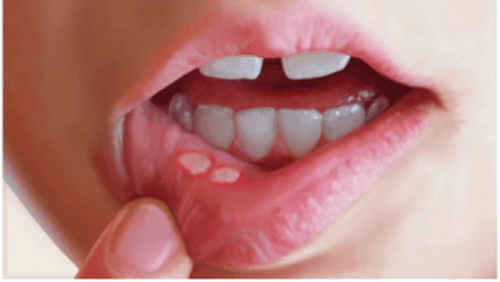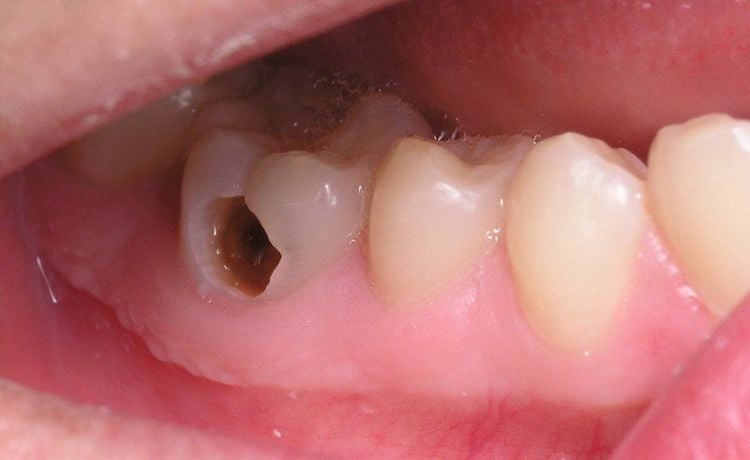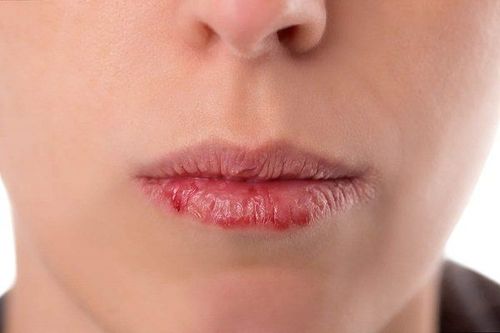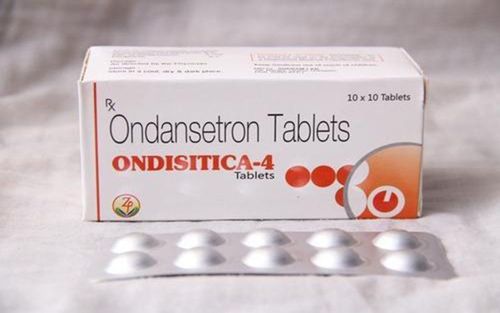This is an automatically translated article.
The article is professionally consulted by doctors working at Oncology Center - Vinmec Central Park International General HospitalHead and neck cancer is an important health problem worldwide. It is a global health problem, with about half a million new cases diagnosed each year, and the incidence appears to be increasing in developing countries.
Oral complications in radiation therapy for head and neck cancer
Complications of radiation to the head and neck area can be divided into two groups based on the time of occurrence. Acute complications occur during radiation therapy, and late complications occur after radiation therapy is completed. The anatomy and physiology of this region are unique and complex. Body function and shape are critical to a patient's visual perception of quality of life. The majority of patients with squamous cell carcinoma of the head and neck are middle-aged, adult males from low socioeconomic classes, often chronic smokers and alcoholics. These patients tend to be less conscious and have less social support than other cancer patients.It is important to prevent and treat oral complications, which requires a multidisciplinary approach that includes a team of oncologists, dentists, dietitians, therapists , social workers and, in some cases, plastic surgeons, and psychologists are consulted.
Radiation dose
Radiation therapy involves delivering a precise dose of radiation to the tumor while reducing the dose outside of the tumor. The amount of radiation is expressed in standard units of Gray (Gy) defined as J/kg. Rothwell et al. found that most oral complications were dose-dependent and serious adverse events occurred when doses >45 Gy were administered bilaterally to the mouth, jaw, and salivary glands.Complications of radiation therapy for head and neck cancer
Oral complications of radiation in head and neck cancer can be severe, potentially leading to permanent tissue changes, and the patient is at risk for serious chronic complications.Therefore the patient should:
Dental examination and diagnosis of oral disease Prevention of complications of head and neck radiation Beware of the following: Oral mucositis
Early infection
Taste dysfunction
Dry saliva.

Viêm niêm mạc miệng
Dental care review
Removal of dental disease and implants to maintain maximum oral health should be key components of patient assessment and care prior to initiation of radiation therapy and should be comprehensively examined. weeks before the radiation started. This gives an appropriate amount of time for tissue healing in the event that invasive oral procedures are required, including extraction, dental/polishing, and endodontic treatment.The goal of this assessment is to identify teeth at risk for infection, bad teeth, and possibly optimize invasive or non-invasive dental treatment during and after radiation that increases the risk of necrosis. X-rays are needed such as a panorex of the jawbone. Perform a full oral examination including periodontal examination. These steps will identify a potential source of infection and require dental work, such as cavities, sharpening of sharp and protruding edges, orthodontic appliances, and partial and complete dentures. clean and adjust. Pre-radiation tooth extraction should be performed 10-21 days prior to avoid the risk of osteonecrosis (ORN). All major surgeries need to be done 4-6 weeks in advance of radiation therapy Take a full prophylactic with fluoride treatment and home care instructions for disease control Prior to making an appointment To make an appointment to see a patient, the general practitioner needs to have the oncologist's diagnosis, treatment plan, prognosis, and medical history.
Complications caused by radiation therapy
Oral complications of radiation in the head and neck region can be divided into two groups based on the normal time of occurrence.Acute Complications: A single dose of radiation therapy in head and neck cancer typically totals 64 Gy to 70 Gy in 32 to 35 fractions with daily doses of 1.8-2.0 Gy per fraction. Acute complications appear 1-2 weeks after radiation begins, it also depends on the dose and location of radiation.
Oropharyngeal mucositis Change in saliva composition Loss of taste Infections (bacterial, fungal and viral) Pain around the teeth Chronic complications:
Jaw tightness and fibrosis Malnutrition Jaw bone necrosis Tooth decay Dry mouth. These symptoms may subside 2 to 4 weeks after complete cessation of radiotherapy, sometimes tissue necrosis may be seen late in the course of treatment, but this is relatively rare.

Sâu răng do xạ trị
Oral mucositis caused by radiation
One of the earliest complications of radiation therapy is the development of mucositis. Soft tissues in the field of irradiation after a week or two may become inflamed and red. With continued radiation, the mucosa can have varying degrees of desquamation and actual ulceration, resulting in pain and painful swallowing that deprives the patient of a balanced diet, resulting in significant weight loss and malnutrition.Oral mucositis is an acute, life-threatening disease. This adverse effect is due to an early change in the oral mucosa tissue that is very sensitive to radiation doses. The development of mucositis depends on the dose of radiation, the angle of the tumor site and the degree of oral hygiene. Mucositis occurs anywhere there is mucosal covering including the oral cavity, esophagus, larynx, and pharynx; clinically, oral mucositis appears to be due to epidermal fibrosis and vasodilation. This can lead to mouth ulcers or sores, scrapes, and pseudomembranous layers. Oral mucositis causes pain and increases the risk of developing systemic infections due to bacterial, fungal, or viral infections in the mouth.
Recommendation: Patients undergoing radiation therapy should be monitored weekly as needed to ensure no mouth ulcers Patients should eat small amounts of 4-6 servings of meals per day instead of three large meals Eat plenty of nutritious fluids Nutrients are easy to swallow and as soups, milkshakes, and ya-ourts. Psychological counseling for the patient if necessary. Maintain oral hygiene: Brush teeth and gums with a soft-bristled brush 2-3 times daily for 2-3 minutes Rinse toothbrush with hot water every 10-30 seconds to soften bristles if necessary Use antiseptic rinses Use fluoride toothpaste with mild flavors such as flavorings that can irritate the mouth, (especially mint flavors) Gargle. Use every 2 hours to relieve mouth pain, dissolve 1⁄4 teaspoon salt and 1⁄4 teaspoon sodium bicarbonate in 1 cup of water Use lip care products such as cream with lanolin (sheep fat) to prevent prevent drying and cracking. Take care of your teeth: Brush your teeth and rinse your mouth daily. Use a soft toothbrush when cleaning dentures. Keep dentures wet when they are not worn, place them in water or a solution to soak the teeth.
As the severity of oral mucositis increases, local pain management strategies become less effective, relying on systemic analgesics to treat mucositis pain.
As there is usually no risk of bleeding with analgesics in patients receiving head and neck radiation therapy, treatment can be initiated with non-steroidal anti-inflammatory drugs (NSAIDs)
As pain increases, NSAIDs are combined with the drug. other and the patient can be relatively comfortable.
Prevention may be the most important factor for the development of oral mucositis, however, it is difficult to prevent as well as to treat.
Acute mucositis begins during the second or third week of XT and subsides within 8-10 weeks after completion of treatment. Good oral hygiene is the best way to reduce complications. Regularly clean your teeth daily and rinse your mouth with a mixture of salt and sodium bicarbonate in water or a dilute solution of hydrogen peroxide and water that works to soothe the affected area. Other therapies include gargling with Benadryl ointment, fate sucrate solution, and a local anesthetic.
Infection
Damage to the lining of the mouth and a weakened immune system make infections more likely, and oral mucositis damages the lining of the mouth allowing bacteria, viruses, and fungi to enter the bloodstream. Common dry mouth during radiation therapy to the head and neck area can also increase the risk of infection in the mouth.Infection can be caused by bacteria, viruses or fungi.
The literature review showed that the mean prevalence of candidiasis in head and neck radiotherapy was 37.4%. Predisposing factors for clinical fungal infection in this population include:
Decreased salivation caused by radiation damage to the salivary glands Tissue damage from radiation mucositis. Due to excessive diet Inability to maintain oral hygiene. In this case, topical antifungals such as mouthwash with nystatin and clotrimazole. Patients taking topical antifungals are advised to avoid eating, drinking, and rinsing their mouths for at least 30 minutes after application. For persistent lesions, systemic agents such as fluconazole are very effective. Bacterial infections can be treated with
Maintain oral hygiene Oral antibiotics / systemic antibiotics Maintain the nutritional status of the patient. Viral infections: Viral infections are uncommon in patients receiving radiation therapy, continuing regular dental care will help prevent infection.
Loss of taste

Mất vị giác là tác dụng phụ phổ biến nhất trong quá trình xạ lưỡi
The receptors in the oral mucosa and pharynx exposed to radiation become damaged and the discrimination of taste becomes increasingly impaired. Foods that appear to have no taste or may not taste like they did before cancer treatment can cause changes in the sweet, sour, bitter and salty taste of many patients, taste buds recovery is possible 6-8 weeks or more after radiation therapy ends. Zinc sulfate supplements may help some patients restore their senses (200 mg 2-3 times a day). This change can be permanent in some patients.
To learn more about radiation therapy for head and neck cancer at Vinmec, you can contact HOTLINE: 0938 506 009 or register online HERE.
Invite readers to refer to the rest of the Guidelines for Oral Care in Head and Neck Cancer:
MORE:
Symptoms of dry mouth in radiation therapy for head and neck cancer Orthopedic care after radiation head and neck cancer treatment Information handbook to support patients receiving radiation therapy in the head and neck area












